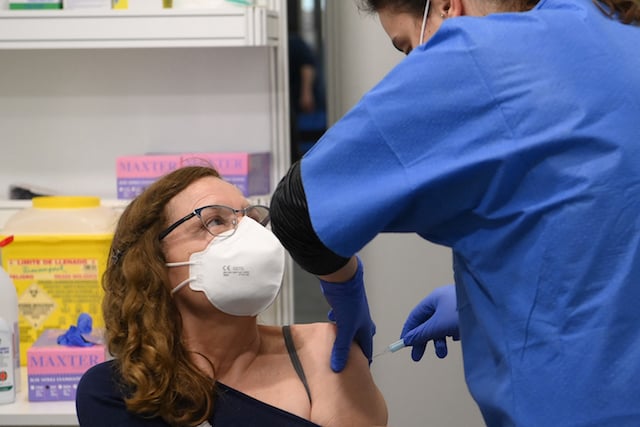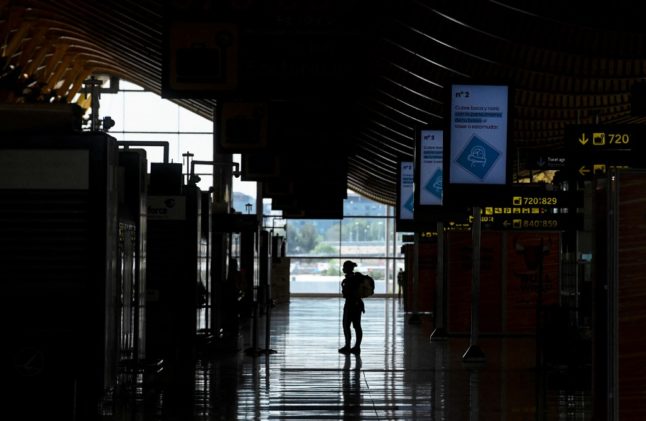Cross-border vaccine coordination is still in its early stages, so while it’s not likely that you will be able to go back home to get the vaccine, there are some places where it is possible.
There is no official word from the Spanish authorities on this subject yet, but The Local Spain has discovered that many foreign residents in Spain have done exactly that, travelling back to their home countries to get their first dose.
This is particularly true of some American residents in Spain who are choosing to go back to the US to get the vaccine, instead of waiting for their slot here as it may take a quite a while for their group to become eligible for the vaccine.
The United States’ vaccine rollout has been much faster than Spain’s with around 31 percent of its population already fully vaccinated compared to around nine percent for the Iberian nation.
The United States is projected to have more than 300 million spare doses (not including those earmarked for most of the country’s children when they become eligible), according to the Duke Global Health Innovation Center.
The Local Spain spoke with several US citizens who have flown back home to get the vaccine.
“I didn’t go back specifically to get the vaccine, but I did have to go back, and the vaccine was a nice plus,” Kevin Sullivan, who lives in Madrid, told The Local.
Not only is it possible for US citizens to get the vaccine back in their home countries, but it seems to be a very easy process too.

“I just requested it and didn’t need a primary care physician or insurance, and did not have any out-of-pocket expenses either. I did it with a grocery store in Texas. It’s actually possible to request even if you’re non-citizen, as they want undocumented people vaccinated as well,” Sullivan explained.
Laura Kitchin who lives in Barcelona told The Local: “I flew back to the US and got the vaccine. I do maintain my US driver’s license there, so I had zero problems getting it. The only hurdles were the paperwork and tests in order to fly back”.
Several other US residents in Spain told The Local that they had also either flown back to their country to get the vaccine or had got it when they went back to visit, but requested not to be named.
The UK’s vaccine drive is also going a lot faster than Spain’s, so will it be possible to travel back to the UK to visit family over the summer and get vaccinated there instead?
All official UK government sources state that you must be registered with a GP surgery in the UK in order to be able to get the vaccine there. Chances are that if you’re a resident in Spain, you won’t still be registered with a surgery in the UK.
If you are registered with a GP in the UK, you may have to prove you live in the UK to get the vaccine and will be questioned as to where you received your first vaccine and why.
The UK government is asking its citizens who live abroad to wait and get the jab in their country of residence. The country hopes to avoid unnecessary international travel and place additional strain on the UK’s National Health Service.
“Anyone who is returning to live in the UK from abroad will be eligible for the vaccine in line with the Joint Committee on Vaccination and Immunisation (JCVI) priority list. Britons living overseas should obtain the vaccine in their country of residence. They cannot arrange a vaccine in the UK from overseas,” a spokesperson for the UK Department of Health told The Express.
Therefore, you may only be able to get your first or second dose of the vaccine in the UK if you are moving back there permanently, not if you’re simply visiting over spring or summer.



 Please whitelist us to continue reading.
Please whitelist us to continue reading.
Hi, I’m Roderick in Barcelona, I decided to return to the US for the vaccine. I opted for the J&J ‘one-and-done’ shot. I have a digital card on my mobile from the State of NY called the “Excelsior Pass” and the funky CDC card that any child could make on a computer. My question is will Spain or UK or greater EU accept this, will I qualify for whatever digital green pass they are planning? CatSalut called me yesterday to get the vaccine here and I told them I’ve been vaccinated and to please make a note of it on my medical records which they did but I just want to be able to stop paying for darn expensive PCR tests every time I travel.